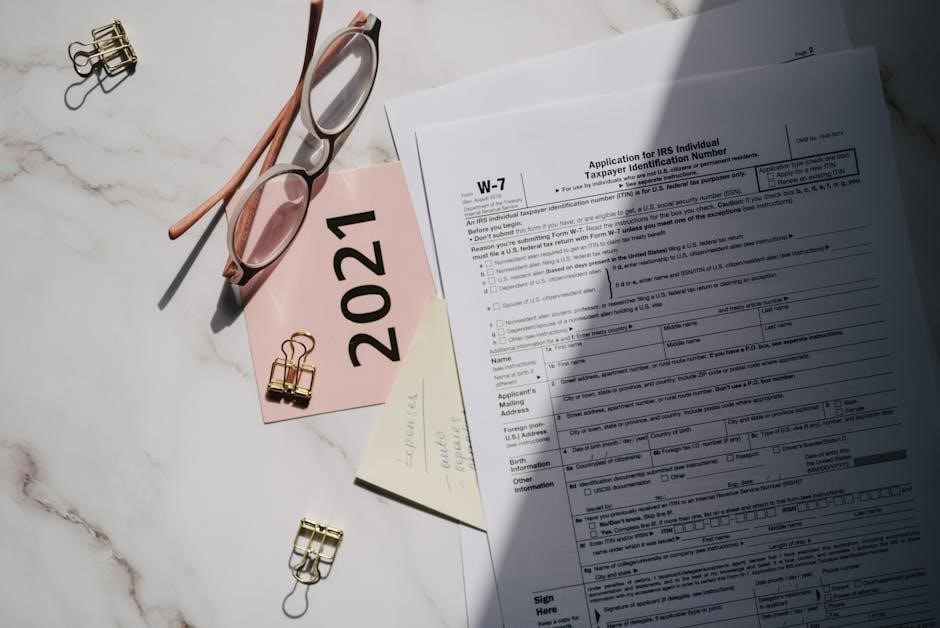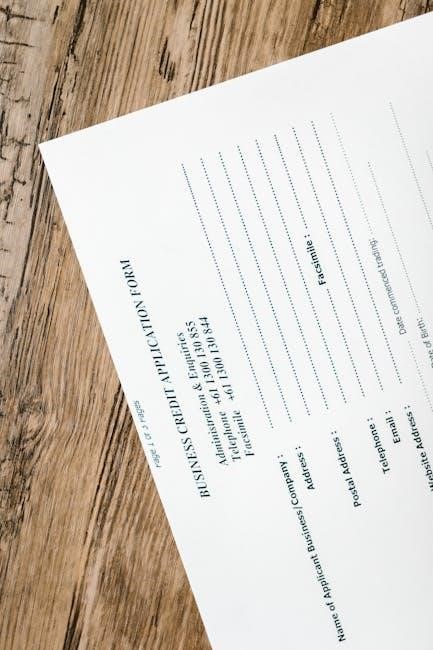The British Columbia Rental Application Form is a standardized document used by landlords to assess potential tenants․ It ensures a fair and structured rental process, protecting both parties by gathering essential information about the applicant’s personal, financial, and rental history․ This form is crucial for landlords to evaluate suitability and for tenants to demonstrate reliability․ Understanding its requirements helps both parties navigate the rental process smoothly and legally․
Overview of the Rental Application Process in BC
The rental application process in British Columbia is designed to ensure fairness and transparency for both tenants and landlords․ It typically begins with a tenant submitting a completed rental application form, which includes personal, financial, and rental history details․ Landlords then review the application, often conducting credit checks and verifying references․ The process also involves ensuring compliance with BC tenancy laws, which protect tenants from discrimination and unreasonable requests․ Once approved, a tenancy agreement is signed, outlining the terms of the rental․ This structured process helps landlords assess suitability while ensuring tenants’ rights are respected․ Understanding the process is key for a smooth experience․
Importance of Understanding the Rental Application Form
Importance of Understanding the Rental Application Form
Understanding the British Columbia Rental Application Form is crucial for both tenants and landlords to ensure a smooth and legally compliant rental process․ For tenants, it helps identify what information is required and ensures they provide accurate details, avoiding delays or rejections․ It also protects tenants from providing unnecessary personal information, as some requests may not be legally required․ For landlords, understanding the form ensures they gather essential data to assess tenant suitability while complying with BC tenancy laws․ This knowledge prevents disputes and fosters a transparent relationship․ By familiarizing themselves with the form, both parties can navigate the process confidently and avoid potential pitfalls․
Required Information on the British Columbia Rental Application Form
The form typically requires personal details, employment info, financial records, rental history, and references, ensuring landlords can assess tenant suitability while complying with BC tenancy laws;
Personal Information and Identification Requirements
The British Columbia Rental Application Form requires applicants to provide personal information, such as their full name, date of birth, and contact details․ Identification is typically necessary to verify identity, with common documents including a valid government-issued ID (e․g․, driver’s license or passport) and sometimes a SIN for credit checks․ Some landlords may also request proof of residency or citizenship status․ While certain fields are mandatory, applicants should be cautious about providing sensitive information, as BC tenancy laws prohibit landlords from demanding excessive or unrelated data․ Tenants are encouraged to understand their rights regarding personal information disclosure to ensure compliance with privacy laws․
Financial Information and Employment Details
The British Columbia Rental Application Form requires applicants to provide financial information to assess their ability to pay rent․ This typically includes employment details, such as job title, employer contact, and length of employment․ Applicants may also need to disclose their monthly income, recent pay stubs, or letters from employers․ Bank account information or recent bank statements may be requested to verify financial stability․ Additionally, landlords often conduct credit checks to evaluate an applicant’s financial history․ While providing this information is standard, tenants should ensure it is used solely for credit review purposes and handled confidentially․ Understanding these requirements helps applicants prepare and demonstrates their financial reliability to landlords․
Rental History and Reference Requirements
The British Columbia Rental Application Form requires detailed rental history to assess a tenant’s reliability․ Applicants must provide previous landlords’ contact information, tenancy dates, and reasons for leaving․ Landlords often contact references to verify the applicant’s behavior as a tenant․ A minimum of two to three years of rental history is typically requested․ If the applicant lacks rental history, they may need to provide alternative references, such as roommates or property managers․ Accurate and honest information is crucial, as misleading details can lead to application rejection․ Providing complete and verifiable rental history demonstrates responsibility and increases the chances of approval․ Ensure references are reliable and responsive to inquiries․

Legal Requirements and Tenant Rights
The British Columbia rental application process must comply with tenancy laws, ensuring landlords respect tenant rights, and applicants are protected from discrimination and unfair practices equally․
Understanding BC Tenancy Laws and Regulations
British Columbia’s tenancy laws, primarily outlined in the Residential Tenancy Act, regulate the rental process, ensuring fairness and transparency for both landlords and tenants․ Key aspects include prohibited grounds of discrimination, allowable application questions, and the requirement for landlords to provide written tenancy agreements․ The Act also governs security deposits, rent increases, and eviction procedures, protecting tenants from unfair practices․ Understanding these laws is crucial for applicants to navigate the rental process confidently and assert their rights effectively․ Familiarity with the legislation helps ensure a smooth and legally compliant rental application experience in BC․
What Landlords Can and Cannot Ask For
In British Columbia, landlords are restricted by law in what they can request from rental applicants․ They can ask for basic personal information, rental history, employment details, and credit checks, as these are relevant to assessing suitability․ However, they cannot request information unrelated to tenancy, such as marital status, number of children, or personal characteristics protected under human rights laws․ Discrimination based on race, gender, disability, or other prohibited grounds is illegal․ Landlords must also avoid asking for excessive documentation or invasive personal details․ Understanding these boundaries helps ensure fair and lawful interactions during the rental application process in BC․
Prohibited Discrimination in Rental Applications
In British Columbia, landlords are legally prohibited from discriminating against rental applicants based on specific protected characteristics under the Residential Tenancy Act and the Human Rights Code․ These protections include race, gender, sexual orientation, disability, age, religion, marital status, family status, or source of income․ Landlords cannot refuse tenancy or impose different terms based on these factors․ For example, they cannot deny an application because of a disability or because someone receives government assistance․ Tenants who experience discrimination can file a complaint with the BC Human Rights Tribunal․ Understanding these protections ensures fair treatment and equal access to housing for all applicants in BC․

Completing the British Columbia Rental Application Form
Accurately fill out all sections, providing required documents like ID, proof of income, and rental history․ Ensure completeness to avoid delays in processing your application․
Step-by-Step Guide to Filling Out the Form
Start by carefully reviewing the British Columbia rental application form․ Begin with personal information, including your full name, contact details, and identification documents․ Next, provide financial details such as employment history, income sources, and bank statements․ Include rental history with previous landlords’ contact information and references․ Be honest and accurate in your responses to avoid discrepancies․ Review the form for completeness and sign it to confirm the information’s accuracy․ Submit the application along with any required fees or supporting documents․ Follow up with the landlord to ensure timely processing and address any additional inquiries promptly․
Common Mistakes to Avoid
When completing the British Columbia rental application form, avoid leaving sections blank or providing incomplete information․ Inaccurate or misleading details can lead to rejection or legal issues․ Ensure all contact information, employment history, and rental references are up-to-date and accurate․ Missing documents, such as identification or proof of income, can delay processing․ Avoid ignoring instructions or failing to sign the form, as this may result in delays․ Double-check for errors or omissions before submission․ Rushing through the application increases the likelihood of mistakes․ Finally, refrain from withholding negative information, such as past evictions, as dishonesty can lead to rejection or future disputes․
How to Submit the Application Effectively
To submit the British Columbia rental application form effectively, ensure all required documents are attached, such as identification, proof of income, and rental references․ Follow the landlord’s instructions for submission, whether in person, by email, or through an online portal․ Deliver the application promptly to increase your chances of being considered․ Make sure the form is fully completed and signed to avoid delays․ Include a cover letter or brief introduction if desired to highlight your suitability as a tenant․ Keep a copy of the submitted application for your records․ Finally, follow up politely with the landlord to confirm receipt and express your interest in the property․

Screening Process and Credit Checks
Landlords in BC use credit checks to assess financial stability․ A higher score strengthens applications․ This process helps landlords evaluate tenant reliability and make informed decisions․
How Landlords Screen Potential Tenants
Landlords in British Columbia typically begin by reviewing the rental application form for completeness and accuracy․ They verify personal information, employment details, and rental history to assess reliability․ Financial stability is evaluated through income verification and credit checks, with a focus on debt-to-income ratios․ Rental history is checked by contacting previous landlords to ensure a positive tenancy record․ References from employers or past landlords are also reviewed to confirm credibility․ In some cases, criminal record checks may be conducted․ This comprehensive screening process helps landlords make informed decisions about potential tenants while ensuring compliance with tenancy laws and regulations in BC․
Role of Credit Checks in the Rental Process
Credit checks play a crucial role in the British Columbia rental process by providing landlords with insights into a tenant’s financial responsibility․ A credit report reveals historical debt repayment patterns, credit utilization, and any bankruptcies or collections․ Landlords use this information to assess the likelihood of timely rent payments and long-term financial stability․ A high credit score may increase an applicant’s chances of approval, while a low score or adverse history could lead to rejection or requests for a co-signer․ Tenants must consent to credit checks under BC law, ensuring transparency and privacy are maintained throughout the process․ This step helps landlords mitigate financial risks effectively․
Keeping Your Personal Information Secure
Protecting personal information is essential when completing a British Columbia rental application form․ Landlords are legally required to handle your data responsibly, ensuring it is stored securely and only used for the purpose of evaluating your tenancy․ Tenants should verify that their information is transmitted through secure channels, especially when applying online․ Avoid sharing sensitive details like Social Insurance Numbers unless absolutely necessary․ Always confirm the legitimacy of the application process and ensure consent forms are included․ By taking these precautions, you can safeguard your privacy and minimize the risk of identity theft or data breaches during the rental application process․

Tips for Tenants to Strengthen Their Application
Submit a complete application with all required documents, ensuring accuracy and transparency about financial stability․ Consider including a co-signer if needed and highlight positive rental history to build trust․
How to Make Your Rental Application Stand Out
To make your rental application stand out, provide a cover letter explaining your situation and why you’re a great tenant․ Include recent photos of your current living space to showcase cleanliness․ Offer to sign a longer lease if possible, as this provides landlords with stability․ Highlight positive references from previous landlords or employers, emphasizing your reliability․ Be proactive by addressing any potential concerns upfront, such as past credit issues, with a clear explanation․ Finally, ensure your application is neatly organized and submitted promptly, demonstrating professionalism and eagerness․ These steps can significantly improve your chances in BC’s competitive rental market․
Importance of Providing Accurate References
Providing accurate references is crucial when completing a British Columbia rental application form․ Landlords rely on references to assess your credibility and reliability as a tenant․ Inaccurate or misleading information can lead to rejection or, in severe cases, legal consequences․ Ensure all contact details for previous landlords, employers, and character references are up-to-date and correct․ This demonstrates transparency and builds trust with the landlord․ Additionally, accurate references allow landlords to verify your rental history and financial stability, increasing your chances of approval․ Always double-check the information before submitting to avoid delays or complications in the application process․
Presenting a Complete and Professional Application
Presenting a complete and professional rental application is essential for making a positive impression on landlords in British Columbia․ Ensure all sections are filled out neatly and thoroughly, avoiding incomplete or illegible information․ Use clear handwriting or type the form if possible․ Organize required documents, such as proof of income, employment letters, and rental history, in a logical order․ A well-structured application demonstrates responsibility and professionalism, increasing your chances of approval․ Pay attention to details like proper formatting and accurate information to show respect for the process․ A polished application reflects your reliability as a tenant and helps you stand out in a competitive rental market․

Digital Tools and Trends in Rental Applications
Digital tools streamline British Columbia rental applications, offering online submission platforms, electronic signatures, and digital agreements․ These tools enhance efficiency, reduce paperwork, and improve accessibility for tenants and landlords․
Using Online Platforms to Submit Applications
Online platforms like RentCafe, Zolo, and PadMapper have transformed how British Columbia rental applications are submitted․ These platforms allow tenants to upload required documents, such as proof of income and rental history, securely․ Landlords can review applications and communicate directly through the platform, streamlining the process․ Many platforms offer mobile-friendly interfaces, enabling applicants to apply on-the-go․ This digital approach reduces paperwork and saves time, while also providing a transparent record of submissions․ Additionally, online platforms often include features like application tracking and real-time notifications, ensuring both parties stay informed throughout the process․ This modern method enhances efficiency and accessibility for all involved․
Electronic Signatures and Digital Agreements
Electronic signatures and digital agreements have streamlined the rental application process in British Columbia․ Platforms like DocuSign and HelloSign enable tenants to sign documents remotely, saving time and reducing paperwork․ Digital agreements ensure that both landlords and tenants have a legally binding record of the terms․ BC’s tenancy laws recognize electronic signatures as valid, providing a secure and efficient way to finalize agreements․ This method is particularly useful for long-distance transactions or urgent applications․ Digital tools also reduce errors and ensure all parties have a clear understanding of their obligations․ This modern approach enhances transparency and convenience for both landlords and tenants in BC․
Future Trends in Rental Application Processes
The future of rental applications in British Columbia is likely to be shaped by advancing technology and evolving tenant-landlord dynamics․ AI-driven applicant screening tools may become more prevalent, streamlining the process while reducing bias․ Blockchain technology could enhance security for digital agreements and payments․ Virtual property viewings and automated rental platforms may dominate, offering convenience and efficiency․ Additionally, there may be a greater emphasis on sustainability and eco-friendly practices in rental agreements․ These trends aim to create a faster, more transparent, and environmentally conscious rental application process for both tenants and landlords in BC․

Landlord Responsibilities and Rights
Landlords in British Columbia must maintain property standards, ensure tenant safety, and comply with tenancy laws․ They have the right to screen applicants and set rent․ Landlords are entitled to collect deposits and enforce lease terms while respecting tenant privacy and rights under the Residential Tenancy Act․
Landlord Obligations During the Application Process
Landlords in British Columbia must adhere to the Residential Tenancy Act when processing rental applications․ They are required to evaluate applicants fairly, without discrimination based on race, gender, or other protected characteristics․ Landlords must ensure transparency by providing clear criteria for tenant selection․ They are also obligated to maintain the confidentiality of personal information collected during the application process․ Additionally, landlords must avoid asking for prohibited information, such as immigration status or marital history․ Failure to comply with these obligations can result in legal consequences․ Landlords must also provide written tenancy agreements and ensure all terms comply with provincial tenancy laws․
How Landlords Can Ensure Compliance with Tenancy Laws
Landlords in British Columbia must familiarize themselves with the Residential Tenancy Act to ensure compliance․ They should avoid asking prohibited questions during the application process, such as inquiries about age, family status, or income sources unrelated to rent payment․ Landlords must maintain the confidentiality of applicants’ personal information and avoid discriminatory practices․ Regularly updating knowledge of tenancy laws and consulting legal resources can help landlords stay informed․ Additionally, ensuring rental policies are fair and non-discriminatory is essential․ Landlords should also keep detailed records of the application and screening process to demonstrate compliance if disputes arise․ This helps protect both landlords and tenants․
Best Practices for Landlords in BC
Landlords in British Columbia should adopt best practices to foster positive tenant-landlord relationships and ensure a smooth rental process․ Creating a clear, detailed rental criteria list helps in fairly evaluating applicants․ Transparency is key; landlords should communicate expectations, lease terms, and property rules upfront․ Using a standardized rental application form ensures consistency and fairness․ Regular property inspections and maintenance demonstrate responsibility and respect for tenants․ Encouraging open communication and promptly addressing concerns can prevent disputes․ Keeping accurate records of all interactions and transactions protects both parties․ By following these practices, landlords can build trust, maintain compliance, and create a positive rental experience for tenants․

Dispute Resolution and Tenant Support
Tenants in British Columbia can resolve disputes through the Residential Tenancy Branch (RTB), which provides mediation and arbitration services․ The RTB website offers guides, forms, and helpline support for tenants facing issues․ Additionally, legal aid services and community organizations provide assistance with eviction prevention and tenancy-related conflicts․ Understanding your rights and seeking timely help are crucial for resolving disputes effectively and protecting your interests as a tenant in BC․
How to Handle Disputes with Landlords
When disputes arise with landlords in British Columbia, tenants should first review their tenancy agreement and understand their rights under BC laws․ Documenting all communication and issues is essential․ Tenants can contact the Residential Tenancy Branch (RTB) for guidance or to file a dispute resolution application․ The RTB provides mediation and arbitration services to resolve conflicts․ Additionally, seeking advice from legal aid services or tenant advocacy groups can help navigate complex situations․ It’s important to approach disputes calmly and professionally, ensuring all actions align with provincial tenancy laws․ Knowing your rights and seeking support early can prevent escalations and protect your interests as a tenant․
Resources for Tenants in BC
Tenants in British Columbia have access to numerous resources to help navigate rental applications and disputes․ The Residential Tenancy Branch (RTB) offers guides, forms, and dispute resolution services․ Tenant advocacy groups, like the Tenant Resource & Advisory Centre (TRAC), provide free legal advice and educational materials․ Online platforms like the BC Housing website and legal aid services are also valuable for understanding rights and responsibilities․ Additionally, local community organizations often host workshops and clinics to assist tenants․ These resources ensure tenants are informed, empowered, and supported throughout the rental process, from application to potential disputes․
Seeking Assistance from the Residential Tenancy Branch
The Residential Tenancy Branch (RTB) is a key resource for tenants in British Columbia, offering assistance with rental-related disputes and concerns․ Tenants can file applications for dispute resolution through the RTB for issues like evictions, repairs, or unpaid deposits․ The RTB provides neutral third-party mediation and arbitration services to resolve conflicts fairly․ Additionally, the RTB website offers guides, forms, and FAQs to help tenants understand their rights and obligations․ For complex issues, tenants can also request a review of decisions․ The RTB ensures that both tenants and landlords are aware of their responsibilities under BC tenancy laws, promoting a balanced and fair rental environment․

Eviction Prevention and Tenant Protection
British Columbia has strong tenant protection laws to prevent unjust evictions, ensuring renters receive fair treatment and legal safeguards against unlawful removal from their homes․
Understanding Eviction Laws in BC
In British Columbia, eviction laws are governed by the Residential Tenancy Act, which protects tenants from unfair practices․ Landlords must follow specific legal procedures to evict tenants, ensuring the process is lawful and non-discriminatory․ Evictions are only permitted for valid reasons, such as non-payment of rent, breach of contract, or if the landlord intends to occupy the property․ Tenants must receive proper notice, typically a 10-day notice for non-payment of rent, before any legal action can be taken․ If a tenant disputes the eviction, they can apply for a dispute resolution through the Residential Tenancy Branch․ Landlords must avoid retaliatory evictions, as these are prohibited under the law․ Understanding these regulations is crucial for tenants to protect their rights and seek legal recourse if necessary․
How Tenants Can Protect Themselves
Tenants in British Columbia can protect themselves by understanding their rights under the Residential Tenancy Act․ They should carefully review and keep copies of all rental agreements, ensuring terms are fair and lawful․ Documenting the condition of the property before moving in, through photos or videos, can prevent disputes over damages․ Tenants should also maintain records of all communications with landlords․ If issues arise, seeking legal advice or contacting the Residential Tenancy Branch is crucial․ Knowing the eviction laws and ensuring all notices are legally compliant can prevent unlawful evictions․ Staying informed and proactive helps tenants safeguard their rights and interests effectively․
Emergency Assistance for Tenants Facing Eviction
Tenants in British Columbia facing eviction can access emergency assistance through various resources․ The Residential Tenancy Branch (RTB) provides dispute resolution services and can help tenants understand their rights․ Legal aid organizations, such as Legal Aid BC, offer free advice and representation for low-income individuals․ Additionally, emergency financial assistance programs, like those offered by BC Housing, can help with rent or utility payments to prevent eviction․ Tenants can also contact local non-profits or community organizations for support․ Acting quickly and seeking professional guidance are key steps to addressing eviction threats effectively and exploring available options to stabilize housing situations․

Additional Resources and References
Explore BC Housing’s official website for rental guides and forms․ Visit the Canadian Mortgage and Housing Corporation (CMHC) for tenant resources․ Legal Aid BC offers legal guidance․
- BC Housing
- CMHC
- Legal Aid BC
Recommended Websites and Guides for Tenants
Tenants in British Columbia can access reliable resources to navigate the rental process․ The BC Housing website provides detailed guides on rental applications and tenant rights․ Additionally, the Residential Tenancy Branch offers dispute resolution services and forms․ For comprehensive rental guides, visit the Canada Mortgage and Housing Corporation (CMHC) website․ Tenants can also find legal assistance through Legal Aid BC․ These resources ensure tenants are well-informed and protected throughout the rental application process․
- BC Housing
- Residential Tenancy Branch
- CMHC
- Legal Aid BC
Important Forms and Documents for Rental Applications
When applying for a rental property in British Columbia, it’s essential to prepare the correct forms and documents․ The standard British Columbia Rental Application Form is widely used, but landlords may also request additional documents․ These typically include proof of identity (e․g․, driver’s license or passport), proof of employment (e․g․, pay stubs or an employment letter), and proof of income (e․g․, tax returns or bank statements)․ Rental history, such as references from previous landlords, may also be required․ A completed Residential Tenancy Agreement is mandatory once approved․ Ensure all documents are up-to-date and organized to streamline the process․
For more information, visit the Residential Tenancy Branch website, which provides downloadable forms and guidelines for tenants․
Community Support and Legal Aid Services
In British Columbia, tenants have access to various community support and legal aid services to assist with rental application processes and tenancy issues․ The Residential Tenancy Branch (RTB) provides resources and dispute resolution services for tenants and landlords․ Additionally, Legal Aid BC offers free legal advice for low-income individuals facing housing challenges․ Non-profit organizations, such as the Tenant Resource & Advisory Centre (TRAC), provide workshops, guides, and advocacy for tenants․ These services help ensure tenants understand their rights and can navigate the rental application process confidently․ Visit the RTB website for more information on available support․